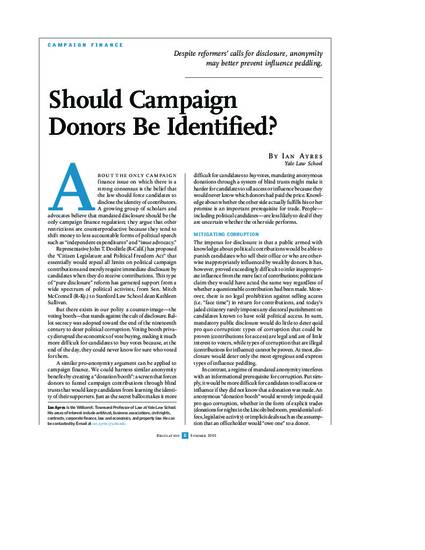
About the only campaign finance issue on which there is a strong consensus is the belief that the law should force candidates to disclose the identity of contributors. A growing group of scholars and advocates believe that mandated disclosure should be the only campaign finance regulation; they argue that other restrictions are counterproductive because they tend to shift money to less accountable forms of political speech such as "independent expenditures" and "issue advocacy."
Representative John T. Doolittle (R-Calif.) has proposed the "Citizen Legislature and Political Freedom Act" that essentially would repeal all limits on political campaign contributions and merely require immediate disclosure by candidates when they do receive contributions. This type of "pure disclosure" reform has garnered support from a wide spectrum of political activists, from Sen. Mitch McConnell (R-Ky.) to Stanford Law School dean Kathleen Sullivan.
But there exists in our polity a counter-image--the voting booth--that stands against the cult of disclosure. Ballot secrecy was adopted toward the end of the nineteenth century to deter political corruption. Voting booth privacy disrupted the economics of vote buying, making it much more difficult for candidates to buy votes because, at the end of the day, they could never know for sure who voted for them.
A similar pro-anonymity argument can be applied to campaign finance. We could harness similar anonymity benefits by creating a "donation booth": a screen that forces donors to funnel campaign contributions through blind trusts that would keep candidates from learning the identity of their supporters. Just as the secret ballot makes it more difficult for candidates to buy votes, mandating anonymous donations through a system of blind trusts might make it harder for candidates to sell access or influence because they would never know which donors had paid the price. Knowledge about whether the other side actually fulfills his or her promise is an important prerequisite for trade. People--including political candidates--are less likely to deal if they are uncertain whether the other side performs.
Available at: http://works.bepress.com/ian_ayres/13/
